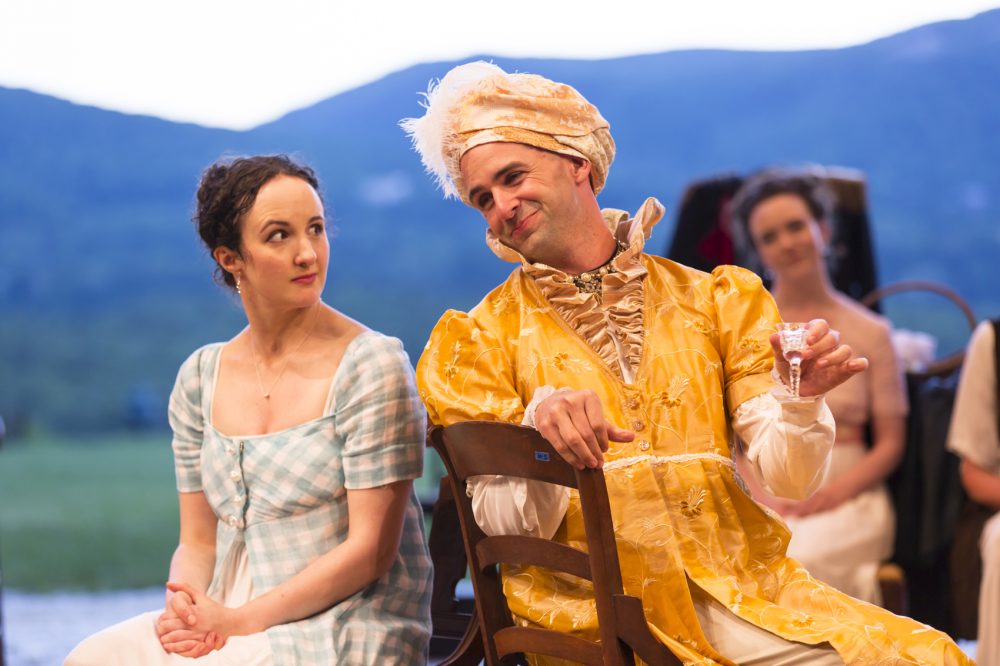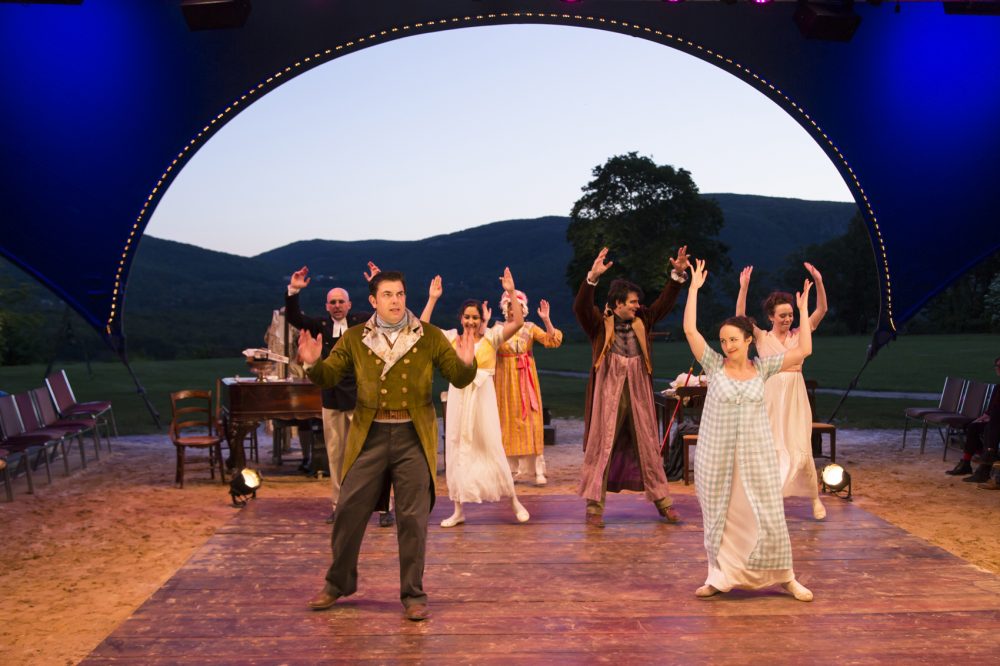Advertisement
Unconventional 'Pride And Prejudice' Onstage At Hudson Valley Shakespeare Festival

This month marks the 200th anniversary of Jane Austen’s death, and "it is a truth universally acknowledged" that Jane Austen fans will be thrilled with a new stage adaptation by playwright and actor Kate Hamill (@katerone). The unconventional production of Austen's "Pride and Prejudice" includes theatrical acting, disco music and men playing women — all while staying true to Austen's original themes.
Hamill joins Here & Now's Robin Young to talk about the show, her work and her passion for Austen.
Interview Highlights
On whether she wrote the adaptation so she could play Elizabeth
"Definitely not, it would be a lot of work to put in. This is my second Jane Austen adaptation. The first one I wrote was 'Sense and Sensibility,' which ran for about a year off-Broadway with Bedlam, and I really wanted to do the Austens in the order that she wrote them. 'Pride and Prejudice' was next, and it's sort of the biggest Austen mountain to climb, because it's the most famous."
On her enduring love for Austen
"I would have to in fact define myself as a Janeite. I always think that it's funny that [Claudia Johnson] described her in this very docile way, because she was very cutting, and funny, and witty, and incisive and sarcastic, and could be quite mean if you read her letters, so I always thought it was so funny that she's thought of as this very placid person, and as a very placid storyteller."
On the prevalence of sexism in Austen analysis
"I actually think there is an element of sexism in how Jane Austen is popularly thought of, because she's sort of dismissed as someone who wrote romantic comedies. And, it's true that the romance and the love in them is so beautiful, but actually, the comedy and the social commentary in it is just as good as any other preeminent male writer. They're very pointed novels, and that's part of what I love so much about them."

On changes she made to the original story
"I'm a big believer that when you're creating an adaptation, or in fact, any piece of art, that you should have a strong point of view on it, and one of the big challenges for me writing 'Pride and Prejudice' was, it's so popular, and it's been done so many times that there actually are pretty good, straightforward versions of it out there. I mean, I would say the BBC series is a really incredible example of that.
"I love to create pieces of theater that are highly theatrical and that are surprising. What I like to do is for the audience to come in expecting something, and come out being like, 'Wow, that was completely different from what I expected.' We think of it as this dated text, but the truth is, all of these rules and behaviors around love, we still very much follow today. There are literally books out there called 'The Rules,' and 'The Game.' And, it's particularly codified for young women, especially today, and I am a young woman who happens to be in a partnership. And I'm someone who's historically been very ambivalent about marriage."
Advertisement
On sharing a stage with her partner Jason O'Connell, who plays Mr. Darcy
"Well, in a way this play, for me, I'm someone who really believes that unless you put yourself into the play as the playwright, it's not going to be very good. 'The pages need to bleed,' as someone once said. So, this is really about me exploring different kinds of matches. Charlotte Lucas chooses a very rational match, someone who can set her up with a fortune, and she's sort of miserable. Lydia, the youngest Bennett sister, runs off impetuously with someone, and that makes her sort of miserable. So one of the matches I had to explore is, what happens when you're someone who's been very ambivalent about marriage, and you're with someone who probably you're going to marry, and what that kind of panic of love, how you fight that. So, doing this with Jason is especially evocative, and it's about learning that you maybe don't know all the answers about how you thought your life and love was gonna be. You know, I was looking forward to having 40 cats later in life, or whatever, but instead I fell in love with this wonderful man, who, he says, a proposal I wrote every night to myself, which is super weird."
On her connection to Austen, and female narratives in theater
"I feel a real connection to Jane Austen. Part of what started me writing — I was an actor before I was a playwright — is because I was so frustrated at the dearth of female narratives in the theater. I mean, a statistic I often quote is, three-quarters of all new adaptations and plays produced last year were by men. And when you add onto that that the classics are almost entirely by men, then we're talking a lot of male narratives. And there's nothing wrong with the male narrative, I love men, but that means that women so often are playing these tertiary roles. I went, 'Oh, you know, I really wish there were more female classics,' and so, then I was like, 'Oh god. I'm gonna have to write one, aren't I?'"
This article was originally published on August 17, 2017.
This segment aired on August 17, 2017.
